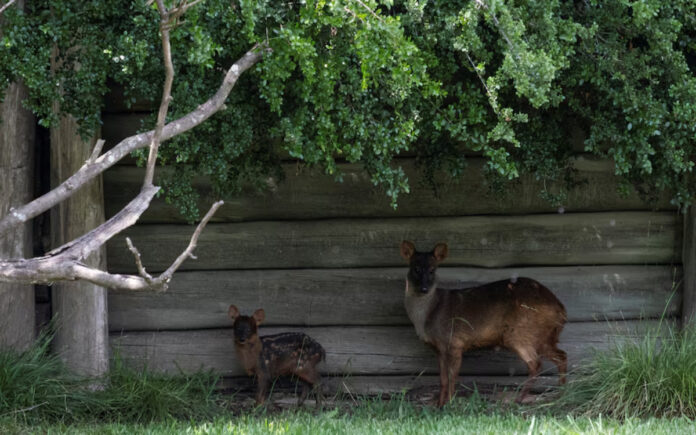Buenos Aires: A rare pudu fawn born at an Argentine biopark earlier this month has sparked a wave of optimism among scientists and conservationists, offering a unique opportunity to study the tiny and elusive deer species. Weighing only 1.21 kg (2.7 lbs), the fragile male pudu, named Lenga after a tree native to the Andean Patagonian forest of Chile and Argentina, represents a vital step forward for the conservation of his species.
“It’s a very enigmatic animal, it’s not easy to see,” said Maximiliano Krause, Lenga’s caretaker at the Temaiken Foundation, a nonprofit focused on preserving wild species. The pudu is one of the world’s smallest deer species, reaching a height of just 50 cm (20 inches) and weighing no more than 12 kg (26.5 lbs).
For now, Lenga is adjusting to his new surroundings, spending his days exploring the park with his mother, Chalten, and father, Nicolino. In the early months, he is breastfeeding, but as he grows, he will transition to a herbivorous diet. As Lenga matures, he will gradually lose the white spots that camouflage him in the wild, a key adaptation that helps him avoid predators, both during the day and at night.
At around one year of age, pudus develop antlers, which grow up to 10 cm (4 inches). These small deer are highly elusive, often fleeing in zigzag patterns when threatened by predators. Despite their agility, they face increasing dangers from wild dogs and invasive species in southern Argentina and Chile. With only an estimated 10,000 pudus left in the wild, the species is classified as near-threatened by the International Union for Conservation of Nature (IUCN).
Also Read | Netflix Wins Lawsuit Over Subscriber Growth Forecasts
“This pudu birth is obviously a joy for us,” said Cristian Guillet, director of zoological operations at the Temaiken Foundation. He emphasized that Lenga’s birth provides crucial insights into the species, helping to further research that could aid in the conservation of pudus and other Patagonian deer, like the huemul.
Also Read | European Commission Gives Green Light to Italy’s €8.7 Billion Payment Request
Guillet expressed hope that the data collected from Lenga’s development will contribute to efforts to protect these endangered creatures from extinction. “This offers hope of saving them from extinction,” he added.



